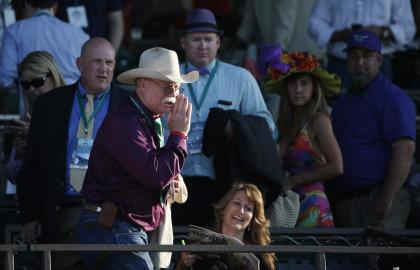Changing the dates, not the rules, is the way to fix horse racing's Triple Crown
ELMONT, N.Y. – Steve Coburn set a new standard for sore losers Saturday, but his timing was impeccable.
Plenty of people hated the fact that the co-owner of California Chrome shot off his mouth like a Roman candle just minutes after his colt lost at the Belmont Stakes. But what better time to get the attention of the nation focused on how to fix a broken Triple Crown? It was a topic on CNN, NBC and plenty of other national platforms Sunday.
Considering the breadth of discussion in the aftermath of yet another Belmont buzzkill, I'd say Coburn did a great job reaching his audience.
Buried beneath the shock value of calling the connections of winning horse Tonalist "cowards" and "cheaters" is the substance of a strong argument. Coburn's horse was asked to perform what has become the unnatural – and, in my opinion, the impossible. We won't see another Triple Crown winner until the format is changed.

Coburn would like to change the rules. I would like to change the dates.
I don't agree with Coburn's assertion that horses should not be allowed to skip legs of the Triple Crown. It's not realistic to limit the pool for the three races to the 20 who enter the Kentucky Derby – the attrition would leave us with an even punier Preakness and a threadbare Belmont. In an ideal world, the top horses in the nation would compete in all three races – but that doesn't fit with the modern reality of horse racing.
Which is why changing the calendar is the best solution.
The hidebound traditionalists who have helped diminish racing to fringe-sport status will fight it to the death. But we may actually be approaching a tipping point in the push to space out the dates of the Kentucky Derby, the Preakness and the Belmont.
Currently, they are five weeks apart – the Derby on the first Saturday in May, the Preakness two weeks later and the Belmont three weeks after that. Maryland Jockey Club president Tom Chuckas is pushing to move the Preakness to the first Saturday in June, and hoping the Belmont will follow suit and move to the first Saturday in July – or, my preference, to the Fourth of July.
It would give the best horse a fighting chance on a more level playing field, but I'm not sure it would make the task of winning all three races easier. Right now, the Preakness is pretty close to a walkover because so many horses skip it to wait for the Belmont, which has become a trap favoring the well-rested and New York-based horses. Filling all three races with high-level competitors would hardly lessen the task.
[Slideshow: Triple Crown winners]
An industry insider told me Sunday that the New York Racing Association has shown very little enthusiasm for moving its race to accommodate the Preakness' proposed move. The interesting scenario would be if Chuckas' group acted unilaterally, moving its race without regard for what the NYRA did or did not do with the Belmont. It would almost certainly help the Preakness become a better race while also drawing away some of the star power of the Belmont, but it would kill the Triple Crown to have the second and third legs a week apart.
This is yet another pitfall of a sport that lacks unified national leadership. There is no commissioner of horse racing, no governing body. Every racetrack ownership group is in it for themselves.
If anyone can affect change, it might have to be NBC using its clout.
Regardless, there is no doubt that the Triple Crown as it currently exists is obsolete. As I've stated (many times), horses simply aren't bred and trained to run three times in five weeks anymore. At most, they tend to run once a month – and often with at least one lengthy break from racing per year. California Chrome trainer Art Sherman, a septuagenarian old schooler, said his ideal timing between races is seven weeks.
The analogy I've made is that it's like asking a baseball pitcher to throw three complete games in a week. They may have done that in the early 20th century, but they sure don't now. And the same can be said for thoroughbreds, which once ran far more often than they do today.
Yet the Triple Crown remains the same unrealistic grind. It's as if human beings shrank to a maximum height of 5 feet 6 but kept basketball goals at 10 feet, then everyone complained about the lack of dunking.
The hidebound are already preemptively grumbling about how changing the dates would cheapen winning the Triple Crown. It wouldn't cheapen the Triple Crown; it would simply return it to the realm of the possible. At present it is unattainable, and I'm glad Steve Coburn opened his big mouth to criticize it.
